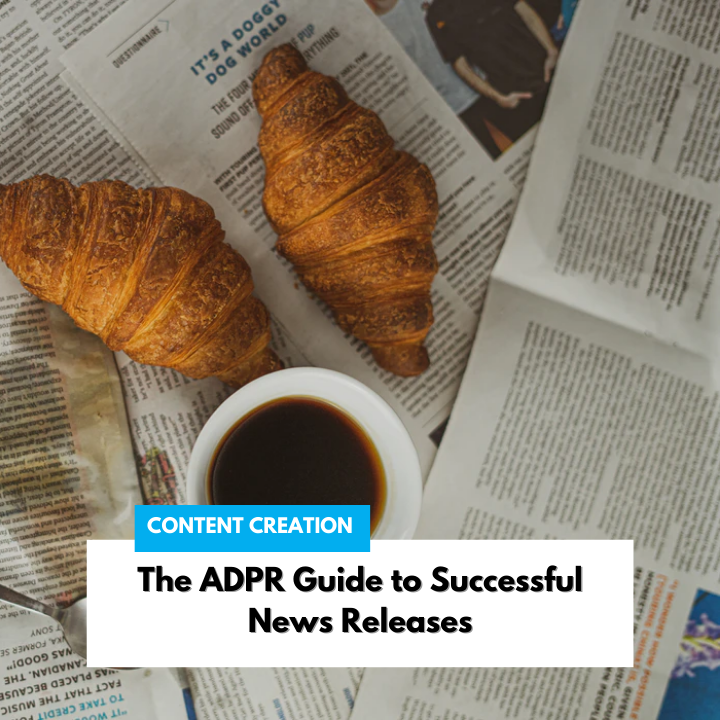
The ADPR guide to successful news releases
A press release (or news release or media release) is a written communication directed at the media to announce something newsworthy. They are typically emailed to editors and journalists at newspapers, magazines, radio stations and TV stations with the aim of securing positive media coverage to boost a company’s profile.
The importance of digital channels now means a news release doesn’t only have to be written, it must also include engaging rich media assets such as video, Q&As and stunning imagery. Another change is that news releases are no longer only aimed at the media but can also directly reach consumers through online sites, articles on a company’s own website and through social media channels. Similarly, communication between your brand and relevant influencers is now just as important as it is with journalists in order to raise brand awareness and enhance your business’s reputation.
We recently covered some initial tips on writing for PR purposes, and below we’ve expanded on exactly what makes a good new release. Just as importantly as a good news release is a plan of who you are going to send it to, and we discuss just that on our Revitalise & Grow podcast, how to create a press list that gets results.
- Make sure your story is newsworthy – is there anything new, unusual or unexpected that people will want to hear about? More tips on newsworthiness here!
- Include an attention grabbing headline – journalists will spend just a few seconds deciding if something looks interesting.
- Be succinct – don’t use jargon and get across your key messages in the first line of the release. A release should ideally fit on to one piece of A4 (two at a maximum), at around 400-500 words. Any background information can be included in the ‘notes to editors’ section at the end of the news release.
- Use quotes – ensure they provide insight and opinion and are not full of jargon or technical language. Always make sure the person quoted would be available for interview.
- Eliminate hype words – such as prestigious, leading, award-winning, unique, game-changer etc. Hype words can be road blocks on the journey to credibility as not only do readers discount these words, they often assume the opposite of what is being said!
- Be sure to use full and accurate punctuation – journalists are time and resource poor so it makes their job much easier if ‘ready to publish’ content is provided (and they don’t have to spend time double-checking everything that has been supplied)
- Journalists are not interested in how pretty the release looks – they would prefer to receive the email as plain text. PDFs and other formats just slow down the editing process and make it more likely your story will be ignored.
- Photos are essential if they add something to the story, and can be the difference between securing a news snippet and a full page feature – but avoid sending big files that clog up inboxes. It’s much better to use a link to Dropbox or WeTransfer.
What to avoid when writing a news release:
- Don’t make the copy too promotional – the release should cover what the benefits are to the customer and make people want to read it, not just shout about the company’s achievements.
- Never write in the first person – this should only be used for quotes with the main copy of the release written in the third person.
- Lengthy approval processes – news releases often need to be drafted and issued within short timescales (if they are to remain newsworthy). A lengthy approval process can mean deadlines are missed and also each person approving will have a different opinion on wording and style, which will ultimately affect the flow of the whole release. Keep your approval processes short and snappy!
- Don’t re-issue the same press release – once a release is approved and issued it should not be re-issued if any further amends are spotted. This can damage your reputation with the journalist and makes your company look sloppy. Instead follow ups can be undertaken with the media or a further email can be sent with something extra to add appeal to the story.
If you want to get more out of your relationship with the media, also check out Episode 1 of Season 2 of our podcast, Revitalise & Grow, which is all about how to write and send out a news release successfully. Our Confident Communication Planning product can also help, as we can produce a six-month plan for you allowing you to benefit from our 30 years of experience of working with press and influencers.





